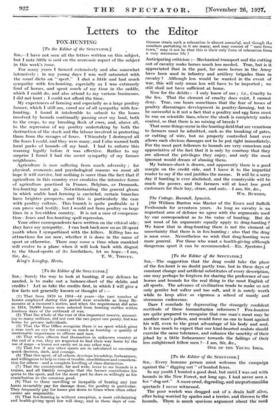[To the Editor of the SPECTATOR.] Sin, — Surely the way to
look at hunting, if any defence be needed, is to make out a balance-sheet of the debits and credits ! Let us take the credits first, in which I will give a few facts not generally known or thought of :-
(1) That from 1870 to 1914-44 years—the vast number of horses employed during this period were available as Army Re- mounts at a moment's notice, and when the requirement did arise in 1914, 70,000 horses were selected from hunting stables within fourteen days of the outbreak of war.
(2) That the whole of the cost of this important reserve, amount- ing to many millions, did not cost the tax-payer one penny, but was borne by private individuals.
(3) That the War Office recognize there is no sport which gives S, man such an eye for country so much as hunting—a quality of inestimable importance to officers and men.
(4) That when officers find themselves in unknown country at the end of a run, they are expected to find their way home by the use of maps—a lesson not easily set in any other way. (5) That few if any other sports are so calculated to encourage quick decision, dash, and courage.
(6) That this sport, of all others, develops friendship, forbearance, and willingness to help in time of trouble, unselfishness and considera- tion for others—and a complete levelling of class distinction.
(7) That the countryside, far and wide, loves to see hounds is a truism, and all frankly recognize that the farmer contributes his quota to the sport, and for the most part he does so willingly as his contribution to the common good.
(8) That to these unwilling or incapable of bearing any lass hunts invariably pay for damage done, for poultry in particular. They frequently pay for losses put down to foxes when often other
causes are responsible.. . .
(9) That fox-hunting is, without exception, a most exhilarating and health--giving sport' few will deny, and in these "days of con-
tinuous strain such a relaxation is almost essential, and though the numbers partaking in it are many, and may consist of " men from town," may it not be that this is their only form of relaxation from a very strenuous life ?
Anticipating criticism :—Mechanical transport and the cutting out of cavalry make horses much less needed. True, but is it appreciated that in the past, far more horses in the Army have been used in infantry and artillery brigades than in cavalry ? Although less would be wanted in the event of war, this will only mean less will have to be imported ; we still shall not have sufficient at home.
Now for the debits :—I only know of one ; i.e., Cruelty to the fox. That the element of cruelty does exist, I cannot deny. True, one hears sometimes that the fear of losses of poultry discourages development in poultry-farming, but to be successful is it not a fact that a poultry and egg farm must
be run on scientific lines, where the stock is completely under control, so that there is no mixing of breeds ?
That some things occur in the hunting-field that arc vexatious to farmers must be admitted, such as the breaking of gates, or cutting of wire, but no properly controlled hunt ever allows such obvious damages not to be put right immediately. For, the most part followers to hounds are very conscious and appreciative of the fact that it is only by courtesy that they are allowed the privileges they enjoy, and only the most ignorant would dream of abusing them.
My balance-sheet is drawn, and apparently there is a good margin on the credit side, and I leave it to the impartial reader to say if the end justifies the means. It will be a sorry day if hunting is ever abolished, and the countryside will be much the poorer, and the farmers will at least lose good customers for their hay, straw, and oats.—I am, Sir, &c., WM. BURTON.
The Cottage, Burstall, Ipswich.
[Sir William Burton was Master of the Essex and Suffolk Foxhounds for seventeen years. As long as cavalry is an important arm of defence we agree with the arguments used by our correspondent as to the value of hunting. But do not most of his arguments equally apply to drag-hunting ?
We know that in drag-hunting there is not the element of uncertainty that there is in fox-hunting ; also that the drag is soon over. Nevertheless we wish that drag-hunting were more general. For those who want a health-giving although dangerous sport it can be recommended.—En. Spectator.]






















































 Previous page
Previous page